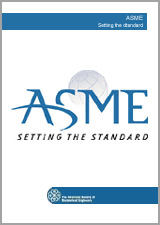We need your consent to use the individual data so that you can see information about your interests, among other things. Click "OK" to give your consent.

ASME PTC31:2011(R2017)
High-Purity Water Treatment Systems
Translate name
STANDARD published on 2011
The information about the standard:
Designation standards: ASME PTC31:2011(R2017)
Publication date standards: 2011
SKU: NS-1205181
The number of pages: 62
Approximate weight : 186 g (0.41 lbs)
Country: American technical standard
Category: Technical standards ASME
Annotation of standard text ASME PTC31:2011(R2017) :
This Code defines the procedures for the accurate field testing of high-purity water treatment systems for the purpose of determining level of performance. It is based on the use of accurate instrumentation and the best analytical and measurement procedures available.
This Code is recommended for use in conducting acceptance tests of high-purity water treatment systems. If so used, any deviations from Code procedure must be agreed upon in writing. In the absence of written agreement, the Code requirements shall be mandatory. Upon completion of tests, the report issued should provide all necessary base line data against which all future operational test results can be measured to assess deterioration of performance in the interim.
Before formulating the procedure for testing a specific process or system, the Code on General Instructions PTC 1 should be studied and followed in detail.
Reaffirmed: 2017
We recommend:
Technical standards updating
Do you want to make sure you use only the valid technical standards?
We can offer you a solution which will provide you a monthly overview concerning the updating of standards which you use.
Would you like to know more? Look at this page.



 Cookies
Cookies
